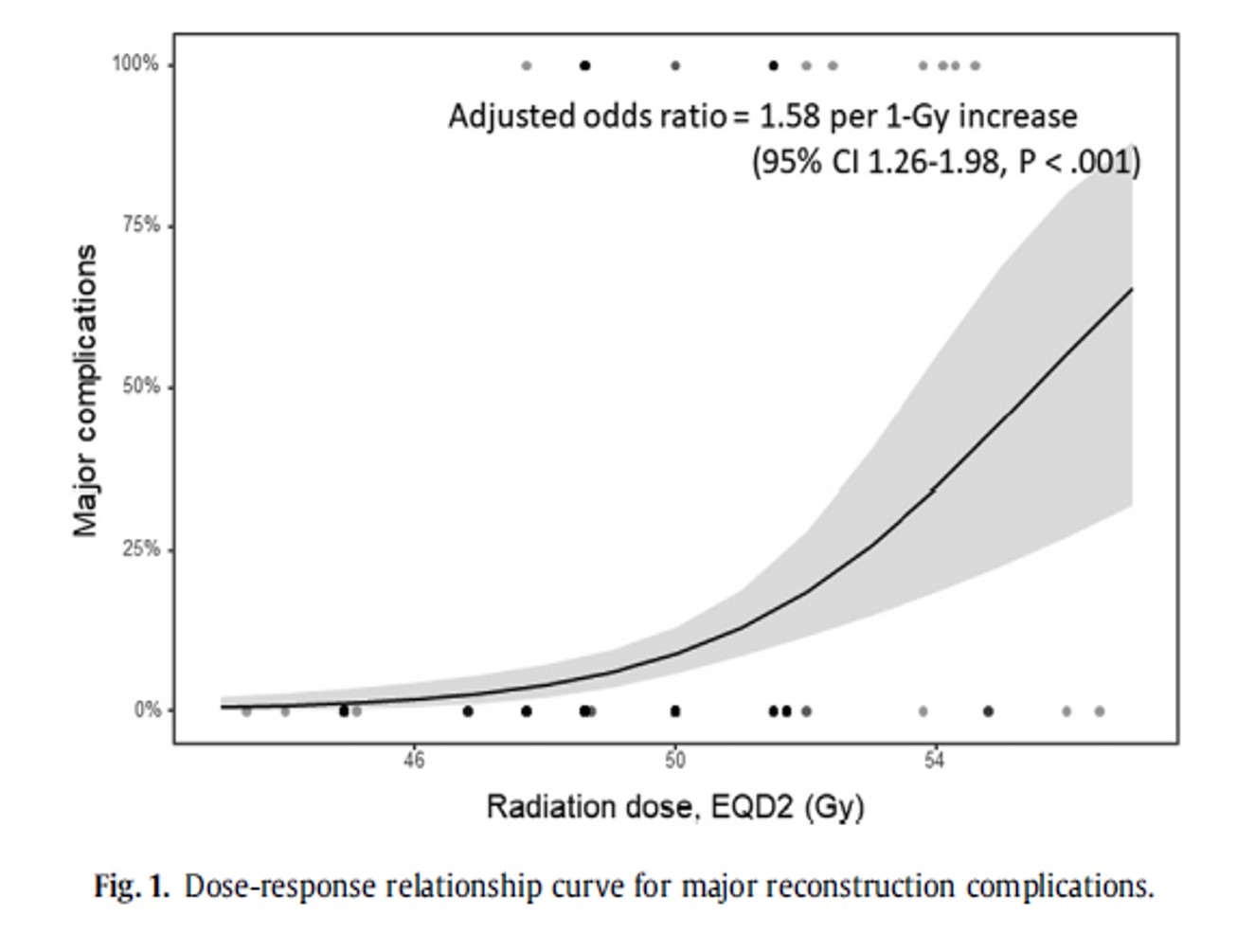글로벌 연구동향
방사선종양학
- [Breast.] Impact of radiation dose on complications among women with breast cancer who underwent breast reconstruction and post-mastectomy radiotherapy: A multi-institutional validation study
서울의대, 연세의대 / 정승연, 신경환*, 김용배*
- 출처
- Breast.
- 등재일
- 2021 Apr
- 저널이슈번호
- 56:7-13. doi: 10.1016/j.breast.2021.01.003. Epub 2021 Jan 20.
- 내용
Abstract
Purpose: Emerging data suggest that higher radiation doses in post-mastectomy radiotherapy may be associated with an increased risk of reconstruction complications. This study aimed to validate previous findings regarding the impact of radiation dose on complications among women with breast cancer using a multi-center dataset.Methods: Fifteen institutions participated, and women with breast cancer who received radiotherapy after either autologous or prosthetic breast reconstruction were included. The primary endpoint was major post-radiation therapy complications requiring re-operation for explantation, flap failure, or bleeding control.
Results: In total, 314 patients were included. Radiotherapy was performed using both conventional fractionation and hypofractionation in various schedules. The range of the radiation therapy dose in Equivalent Dose in 2 Gy fractions (EQD2; α/β = 3.5) varied from 43.4 to 71.0 Gy (median dose: 48.6 Gy). Boost radiation therapy was administered to 49 patients. Major post-radiation therapy complications were observed in 24 (7.6%) patients. In multivariate analysis, an increasing EQD2 per Gy (odds ratio [OR]: 1.58, 95% confidence interval [CI]: 1.26-1.98; p < 0.001), current smoking status (OR: 25.48, 95% CI: 1.56-415.65; p = 0.023), and prosthetic breast reconstruction (OR: 9.28, 95% CI: 1.84-46.70; p = 0.007) were independently associated with an increased risk of major complications.
Conclusion: A dose-response relationship between radiation dose and the risk of complications was validated in this multi-center dataset. In this context, we hypothesize that the use of hypofractionated radiotherapy (40 Gy in 15 fractions) may improve breast reconstruction outcomes. Our multi-center prospective observational study (NCT03523078) is underway to further validate this hypothesis.

Affiliations
Seung Yeun Chung 1 , Jee Suk Chang 2 , Kyung Hwan Shin 3 , Jin Ho Kim 4 , Won Park 5 , Haeyoung Kim 5 , Kyubo Kim 6 , Ik Jae Lee 7 , Won Sup Yoon 8 , Jihye Cha 9 , Kyu-Chan Lee 10 , Jin Hee Kim 11 , Jin Hwa Choi 12 , Sung-Ja Ahn 13 , Boram Ha 14 , Sun Young Lee 15 , Dong Soo Lee 16 , Jeongshim Lee 17 , Sei One Shin 18 , Sea-Won Lee 19 , Jinhyun Choi 20 , Mi Young Kim 21 , Yeon Joo Kim 22 , Jung Ho Im 23 , Chang-Ok Suh 23 , Yong Bae Kim 24
1 Department of Radiation Oncology, Yonsei Cancer Center, Yonsei University College of Medicine, Seoul, Republic of Korea; Department of Radiation Oncology, Ajou University School of Medicine, Suwon, Republic of Korea.
2 Department of Radiation Oncology, Yonsei Cancer Center, Yonsei University College of Medicine, Seoul, Republic of Korea.
3 Department of Radiation Oncology, Seoul National University College of Medicine, Seoul, Republic of Korea. Electronic address: radiat@snu.ac.kr.
4 Department of Radiation Oncology, Seoul National University College of Medicine, Seoul, Republic of Korea.
5 Department of Radiation Oncology, Samsung Medical Center, Sungkyunkwan University School of Medicine, Seoul, Republic of Korea.
6 Department of Radiation Oncology, Ewha Womans University College of Medicine, Seoul, Republic of Korea.
7 Department of Radiation Oncology, Gangnam Severance Hospital, Yonsei University College of Medicine, Seoul, Republic of Korea.
8 Department of Radiation Oncology, Korea University Ansan Hospital, Korea University Medical College, Seoul, Republic of Korea.
9 Department of Radiation Oncology, Wonju Severance Christian Hospital, Yonsei University Wonju College of Medicine, Republic of Korea.
10 Department of Radiation Oncology, Gachon University Gil Medical Center, Incheon, Republic of Korea.
11 Department of Radiation Oncology, Keimyung University Dongsan Medical Center, Keimyung University School of Medicine, Daegu, Republic of Korea.
12 Department of Radiation Oncology, Chung-Ang University Hospital, Seoul, Republic of Korea.
13 Department of Radiation Oncology, Chonnam National University Hwasun Hospital, Chonnam National University Medical School, Hwasun, Republic of Korea.
14 Department of Radiation Oncology, Hallym University Dongtan Sacred Heart Hospital, Hwasung, Republic of Korea.
15 Department of Radiation Oncology, Chonbuk National University Hospital, Jeonju, Republic of Korea.
16 Department of Radiation Oncology, Uijeongbu St. Mary's Hospital, The Catholic University of Korea, Uijeongbu, Republic of Korea.
17 Department of Radiation Oncology, Inha University Hospital, Inha University of Medicine, Incheon, Republic of Korea.
18 Department of Radiation Oncology, Andong Medical Group Andong Hospital, Andong, Republic of Korea.
19 Department of Radiation Oncology, Eunpyeong St. Mary's Hospital, College of Medicine, The Catholic University of Korea, Seoul, Republic of Korea.
20 Department of Radiation Oncology, Jeju National University Hospital, Jeju, Republic of Korea.
21 Department of Radiation Oncology, Kyungpook National University Chilgok Hospital, Daegu, Republic of Korea.
22 Department of Radiation Oncology, Asan Medical Center, University of Ulsan College of Medicine, Seoul, Republic of Korea.
23 Department of Radiation Oncology, CHA Bundang Medical Center, CHA University, Seongnam, Republic of Korea.
24 Department of Radiation Oncology, Yonsei Cancer Center, Yonsei University College of Medicine, Seoul, Republic of Korea. Electronic address: ybkim3@yuhs.ac.
- 키워드
- Breast cancer; Breast reconstruction; Major complication; Radiation therapy.
- 연구소개
- 최근 유방전절제술 후 재건술이 급증하고 있습니다. 방사선치료는 재건술의 부작용과 연관성이 있다고 알려져 있는데 본 논문은 국내 15개 병원에서 방사선치료가 재건술의 합병증 발생에 주는 영향을 조사하였습니다. 각 병원의 재건술과 방사선치료는 다양한 형태로 시행되고 있었습니다. 주요한 방사선치료 부작용은 방사선량이 높을수록, 흡연자, 보형물을 이용한 재건에서 많이 발생하는 것으로 나타났습니다. 본 연구를 통해 방사선량과 합병증 발생의 선량반응관계가 확인이 되었고 현재 시행중인 전향적 연구를 통해 확인할 수 있을 것으로 생각합니다.
- 덧글달기
- 이전글 [Radiother Oncol.] Postoperative radiotherapy with intensity-modulated radiation therapy versus 3-dimensional conformal radiotherapy in early breast cancer: A randomized clinical trial of KROG 15-03
- 다음글 [Tuberc Respir Dis (Seoul).] The Effects of Simultaneous Pulmonary Rehabilitation during Thoracic Radiotherapy in the Treatment of Malignant Diseases










편집위원
유방재건술 후 방사선치료를 받은 환자들에서 부작용을 예측할 수 있는 인자를 다기관자료를 이용하여 검증한 논문
2021-06-04 17:46:34